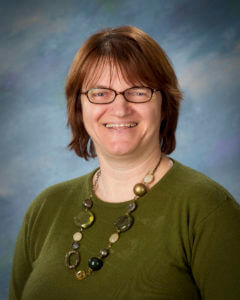
Dr. Sophie Lelièvre
Dr. Sophie Lelièvre, professor of cancer pharmacology in Purdue Veterinary Medicine’s Department of Basic Medical Sciences, is among three finalists for the position of director of the Bindley Bioscience Center at Discovery Park. The finalists were announced by the search committee yesterday (March 29). All three will participate in two-day interviews on campus next month.
Search committee chair Alexandra Boltasseva, professor in the School of Electrical and Computer Engineering, said that as part of the process, each finalist will make a 45-minute public presentation and then take questions from the audience. “We have three excellent candidates,” Dr. Boltasseva said. “I would like to encourage faculty, staff, and students to attend these seminars and provide us their feedback.”
All of the presentations will be given in the Jischke Hall of Biomedical Engineering, Room 1001. Dr. Lelièvre’s presentation, entitled “Bindley Bioscience Center, a Beacon for Integration and Diversity in Multidisciplinary and Interdisciplinary Research,” will be held Thursday, April 5, from 9:00 – 10:00 a.m.
In addition to serving on the Department of Basic Medical Sciences faculty, Dr. Lelièvre also is co-leader of Drug Discovery & Molecular Sensing in the Purdue University Center for Cancer Research; serves as scientific director of the 3D Cell Culture Core Facility in the Birck Nanotechnology Center; and holds a courtesy appointment in the Department of Nutrition Science in Purdue’s College of Health and Human Sciences.
The two other candidates and their presentation times are:
- Gabriel Popescu, professor of electrical and computer engineering at the University of Illinois at Urbana-Champaign and director of the Quantitative Light Imaging Laboratory in the Beckman Institute of Advanced Science and Technology at UIUC, will give a talk entitled, “Multiscale Studies of Cells and Tissues Using Quantitative Phase Imaging,” April 16 from 9:00 – 10:00 a.m.
- S. Ramaswamy, senior professor and dean at the Institute for Stem Cell Biology and Regenerative Medicine, Bangalore, India, will give a talk entitled, “Structural Biology of Proteins Involved in Sialic Acid Uptake and Catabolism in Pathogenic Gram Negative Bacteria,” April 23 from 9:00 – 10:00 a.m.
Feedback on the candidates can be provided via the following link, which will be live after the first presentation: https://purdue.ca1.qualtrics.com/jfe/form/SV_3JKdo054GKFajXf.
The Bindley Bioscience Center is a multidisciplinary research facility where life sciences and engineering researchers collaborate to explore new technologies and scientific knowledge that impact the broad boundaries of plant, animal, and human diseases. The center’s next director will succeed Marietta Harrison, who is serving as interim director.
